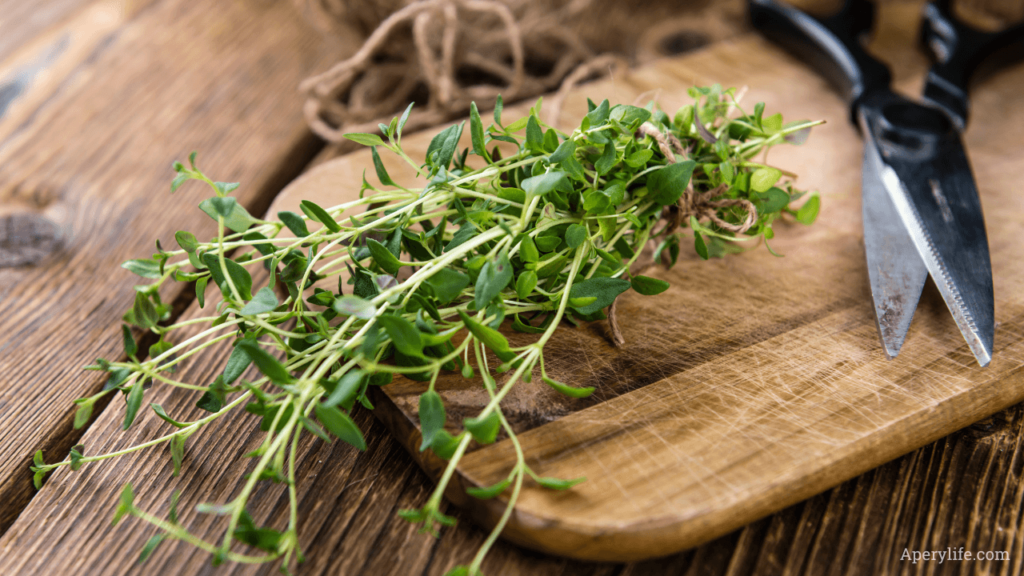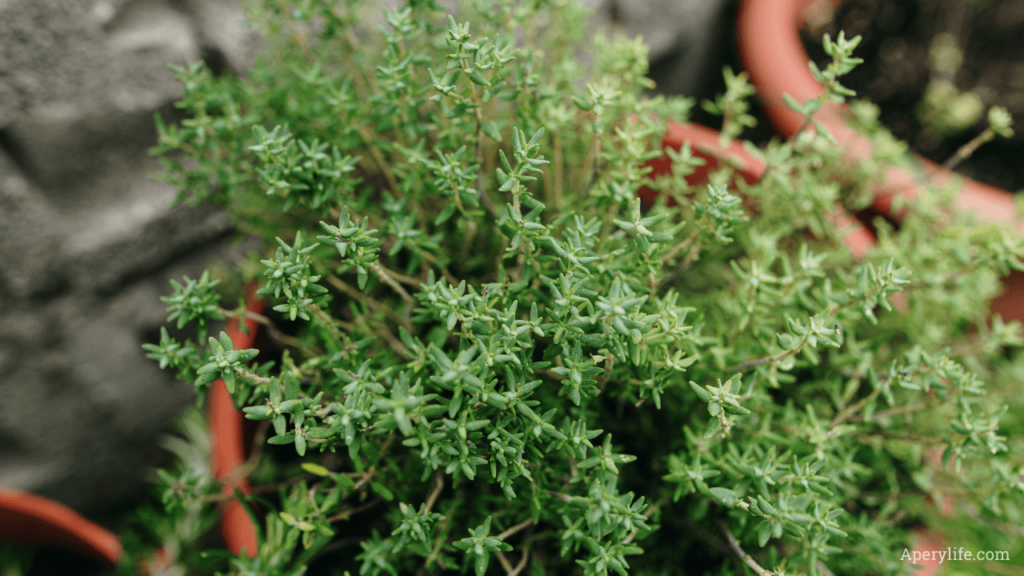Introduction
Thyme is one of the oldest and most valued aromatic herbs, used for centuries both in cooking and for its medicinal properties. With its intense and slightly pungent aroma, thyme is an essential ingredient in Mediterranean cuisine and a valuable natural remedy. There are different varieties of thyme, each with unique characteristics, but all play an important role in preparing flavorful dishes and promoting well-being.
Plant Characteristics
Thyme (Thymus vulgaris) is a perennial plant belonging to the Lamiaceae family. It grows naturally in dry and sunny soils, forming small shrubs with woody stems and small, elongated, green-gray leaves. Its flowers are small and can be white, pink, or lilac, blooming in the summer and attracting bees and pollinators. Thyme is appreciated both fresh and dried, with its leaves used to add flavor to a wide range of dishes.
Types of Thyme
There are many varieties of thyme, each with specific aromas and uses:
- Common Thyme (Thymus vulgaris): The most common variety with a strong, spicy aroma.
- Lemon Thyme (Thymus citriodorus): Has a fresh lemon scent, perfect for seasoning fish dishes.
- Wild Thyme (Thymus serpyllum): Known for its mild flavor, it’s also used as an ornamental plant.
- Carvacrol Thyme: Rich in carvacrol, an active ingredient with antibacterial properties, it is frequently used in herbal medicine.
Nutritional Properties and Benefits
Thyme is not only a delicious aromatic herb but also rich in health benefits:
- Natural Antibacterial: Thanks to thymol, a powerful active ingredient, thyme has antibacterial properties that help fight infections and colds.
- Digestive Aid: It promotes digestion and reduces bloating, making it ideal for rich, hearty dishes.
- Rich in Antioxidants: Contains flavonoids and vitamin C, which help fight free radicals and strengthen the immune system.
- Anti-inflammatory: Its anti-inflammatory properties make it useful for treating respiratory issues like coughs and bronchitis.
- Natural Calmative: Known for its relaxing qualities, it can help reduce anxiety and stress.
Culinary Uses
Thyme is one of the most versatile herbs in cooking, used both fresh and dried in many recipes:

- Marinades: Perfect for marinating meats and fish, giving them an intense, characteristic aroma.
- Soups and Broths: Enhances the flavor of soups and broths, especially those based on legumes.
- Roasted Vegetables: Excellent with potatoes and other roasted vegetables, adding a unique aromatic touch.
- Thyme-Infused Oil: Just infuse some fresh leaves in extra-virgin olive oil for a flavorful dressing to use raw on salads and meats.
- Sauces and Condiments: Pairs well with tomato-based sauces and can be added to pasta and pizza condiments.
How to Grow Thyme
Growing thyme is straightforward due to its adaptability to various conditions:

- Exposure: Thyme prefers direct sunlight and thrives in warm, bright spots.
- Soil: It loves well-drained, poor soil. Excess moisture can lead to fungal growth, so a sandy, nutrient-poor substrate is ideal.
- Watering: A drought-resistant plant, it requires little water; watering is necessary only when the soil is dry.
- Pruning: Regular pruning encourages the growth of new branches and prevents the formation of old wood. Pruning is best done after flowering.
- Harvesting: Thyme leaves can be harvested year-round, but to obtain the most intense aroma, it’s best done during the flowering season in summer. Fresh leaves can be used immediately or dried for long-term storage.
- Container Cultivation: Thyme can be easily grown in a pot, as long as the container has good drainage and is placed in direct sunlight.
Curiosities About Thyme
- Ancient Uses: Ancient Egyptians used thyme as an ingredient in embalming, while the Greeks burned it as purifying incense in temples.
- Symbol of Courage: In the Middle Ages, thyme was considered a symbol of courage and was given to knights before battles.
- Honey Plant: Thyme flowers produce an aromatic honey, rich in beneficial properties.
Conclusion
Thyme is far more than just an aromatic herb. It’s a valuable ally for enhancing our dishes and promoting our health. With its adaptability to different dishes and its medicinal qualities, thyme deserves a prominent place in both the kitchen and natural medicine.
All rights reserved © Copyright Aperylife.com